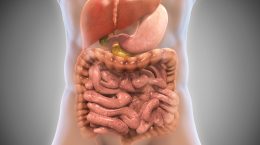Published on September 23, 2021
Video Friday: Research shows how the microbes in our gut can affect the way we think, feel, and act through the microbiome-gut-brain axis
Key Points
- The gut microbiome has the ability to affect physical and mental health
- Research shows that changes in the microbiome can influence depression, influence social interactions, anxiety, autism, memory issues, and more
- The composition of the microbiome and its metabolites can be affected by lifestyle and diet, and can benefit from prebiotic nutrients (such as fiber and omega-3s), vitamin D, and even sunshine or UVB
The gut microbiome is known to have several effects on both mental and physical health. A disruption of a healthy microbiome, called dysbiosis, can contribute to obesity, chronic diseases such as diabetes and heart disease, and even influence your mental-emotional health, as explained in the video below, created by the Neural Academy.
Watch the Video: The Gut Microbiome and The Brain
After watching the video, be sure to make note of our added details below!
Here is a quick summary of what this video discusses, along with additional information and details from GrassrootsHealth:
- The microbiome consists of a community of bacteria, viruses, fungi, protozoa, bacteriophages, and archaea, which plays a major role in health and can affect the progression of various diseases
- It produces metabolites that influence all cells. Changes in gut flora composition can also lead to increased intestinal permeability that allows neuroactive compounds into the blood, some of which can activate the inflammatory response or affect gene expression or affect the way we think and feel.
- The gut, sometimes called the “second brain,” can communicate with the brain and central nervous system; in fact, there are 5 times as many neurons in the gastrointestinal tract as there are in the spinal cord
- The bi-directional interaction between the microbiome and the central nervous system, where one can influence the other, is called the microbiome-gut-brain axis
- A healthy microbiome is essential for normal cognitive and emotional processing. One study in particular showed a link between supplementation with probiotics (which positively affects the gut microbiome), C-reactive protein (hsCRP) levels (markers of inflammation in the body), and Alzheimer’s Disease.
- Research shows that changes in the microbiome can influence depression, influence social interactions, anxiety, autism, memory issues, and more
- The microbiome changes throughout the lifetime, and is affected by our diet and lifestyle – what we eat, stress levels, medications, hormones, and more
- Sunshine can affect the microbiome; in fact, certain diseases, such as multiple sclerosis (MS) and inflammatory bowel diseases (IBD), have a demonstrated link between disease risk and sun or UVB exposure, vitamin D levels, and the microbiome
What Can You Do to Create Positive Changes in Your Microbiome?
This video ends promoting a healthy diet and lifestyle, however, what is considered healthy for the microbiome?
Prebiotics for the Microbiome
Prebiotics are nutritional compounds that are known to benefit health through their effects on the microbiome and its metabolites. In our last post, we reviewed a study showing how supplementing with omega-3 fatty acids resulted in similarly positive and significant changes within the microbiome and its byproducts when compared to supplementing with inulin fiber, a well-known prebiotic supplement. This study demonstrated the prebiotic effects of omega-3s, indicating a new way they can impact our overall health.
Vitamin D Affects the Microbiome as Well
Another study found that vitamin D supplementation over 12 weeks resulted in positive changes in the microbiome in healthy women. Vitamin D supplementation was found to beneficially increase the overall diversity of the gut microbiota, and in particular increased the relative abundance of Bacteroidetes while decreasing the relative abundance of Firmicutes. A high ratio of Firmicutes to Bacteroidetes has been correlated with obesity and other diseases whereas a decreased ratio has resulted in improvements to gut permeability and inflammation. In other words, vitamin D supplementation altered the relative levels of the healthy type bacteria (Bacteriodetes) that are especially associated with improved gut health. These authors suggest that the differences in microbiome may contribute to the large variation seen in blood vitamin D levels in response to vitamin D supplementation.
Similar Shifts in the Microbiome Seen with Sun Exposure
A study conducted by Bosman et al. demonstrated that UVB light from the sun increased serum vitamin D levels and also had a beneficial impact on diversity and abundance of the bacteria species of the microbiome. Another study looked at the differences in microbiome diversity among women who took vitamin D supplements compared to women who did not. They found that the diversity and richness of the microbiota was much lower in those who did not supplement with vitamin D compared to those who did supplement. Exposure to UVB resulted in a significant increase in microbiota diversity and richness among those who did not supplement, but interestingly, no change was observed among those who were supplementing with vitamin D and already had a healthier microbiome. The end result was a similar diversity of microbiota between both groups post UVB. This suggests that individuals with lower vitamin D serum levels have a less diverse microbiota, and that UVB exposure alone is sufficient to increase that diversity.
Make Sure You Are Getting Enough Vitamin D, Omega-3s and Other Important Nutrients
 Having and maintaining healthy vitamin D, omega-3, and other nutrient levels can help improve your health now and for your future. Choose which to measure, such as your vitamin D, omega-3s, and essential minerals including magnesium and zinc, by creating your custom home test kit today. Take steps to improve the status of each of these measurements to benefit your overall health. You can also track your own intakes, symptoms and results to see what works best for YOU.
Having and maintaining healthy vitamin D, omega-3, and other nutrient levels can help improve your health now and for your future. Choose which to measure, such as your vitamin D, omega-3s, and essential minerals including magnesium and zinc, by creating your custom home test kit today. Take steps to improve the status of each of these measurements to benefit your overall health. You can also track your own intakes, symptoms and results to see what works best for YOU.
Enroll and test your levels today, learn what steps to take to improve your status of vitamin D (see below) and other nutrients and blood markers, and take action! By enrolling in the GrassrootsHealth projects, you are not only contributing valuable information to everyone, you are also gaining knowledge about how you could improve your own health through measuring and tracking your nutrient status, and educating yourself on how to improve it.
Help everyone Move Research into Practice with vitamin D and other nutrients! As a special birthday gift to everyone, in honor of the science, we have created a special scholarship fund for anyone to donate to that will go towards helping others participate. Your donation will allow anyone to get help with funding their participation when they need it.
Text-to-give: Text Daction to 44321 to add to our Scholarship Fund.





